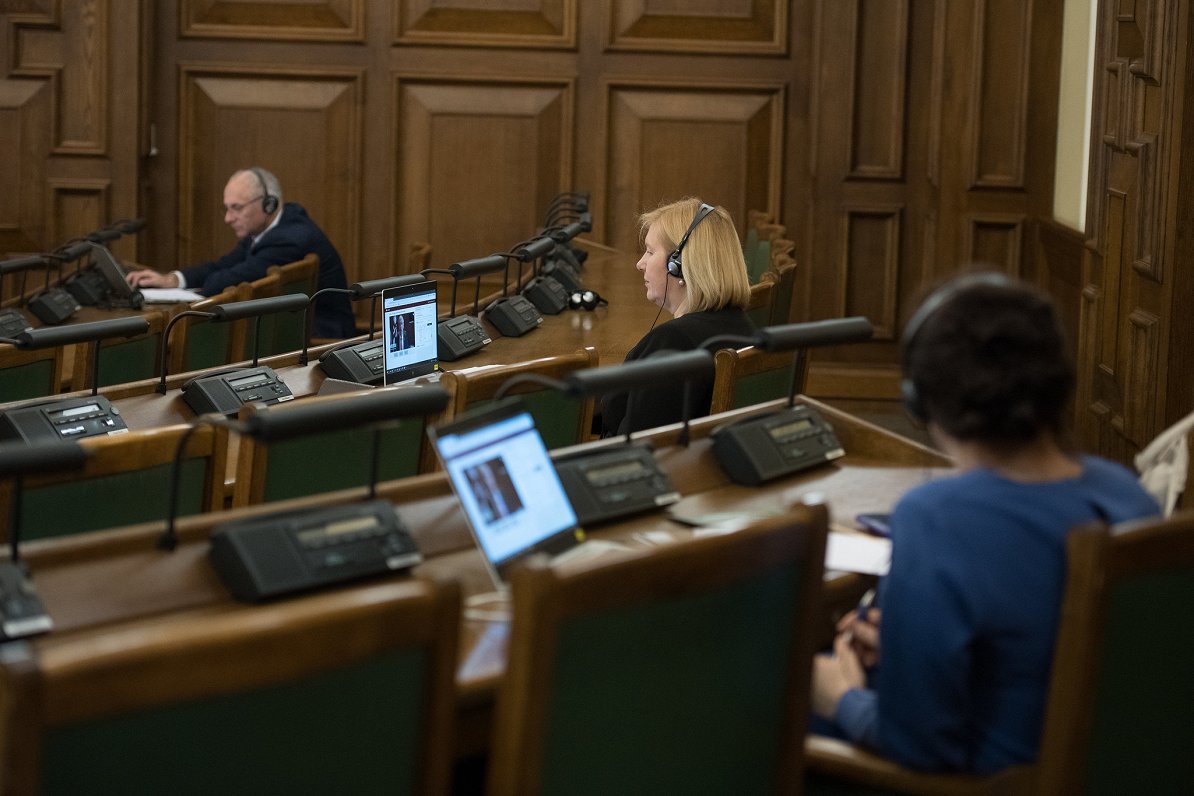The special Saeima session took place in the now familiar hybrid format with a few socially distanced deputies in the debating chamber and others participating online from various different locations. The bil was passed by 63 votes to 25.
Next year, the consolidated budget is planned to be based on 9.58 billion euros in revenue and 10.76 billion euros in expenditure. The basic budget has a revenue of 6.68 billion euros and expenditure of 7.84 billion euros.
Revenues are planned to decrease by 328 million euros next year, but expenditures will increase by 744 million euros, with the budget deficit projected at 3.9 percent of GDP.
"Next year's draft budget clearly outlines our priorities. It is important that higher salaries will be provided for doctors and employees of the education sector, as well as increased social guarantees for people with low incomes,” said Mārtiņš Bondars (Development/For!), Chairman of the Budget Commission which is responsible for overseeign the progress of the budget through Saeima.
The largest increase in funding is for healthcare next year, with an additional 183 million provided for the previously planned increase in the salaries of health workers.
A salary increase is also planned for teachers, and next year it is planned to allocate an additional 33.3 million euros, but in 2022 and in the following years - 49.1 million euros.
In the area of welfare, additional funding of 95.7 million euros is earmarked for a guaranteed minimum income for the poorest members of society. 70.7 million euros are allocated to increase the minimum pension and state social security benefit.
The pandemic crisis has highlighted the need to strengthen social protection for those working in alternative tax regimes, according to an annotation to the draft budget. Thus, it is planned that from July next year these employees will have to pay mandatory social contributions.
From next year, the minimum wage, which is currently 430 euros, is planned to be raised to 500 euros per month. It is also planned to raise the threshold up to which the differentiated personal income is tax-free to 1,800 euros instead of the current 1,200 euros. In turn, the maximum non-taxable minimum is planned to be increased from 250 euros to 300 euros per month next year.
It is planned to set the highest progressive personal income tax rate at 31 percent; so far it has been 31.4 percent.
For another three years - until the end of 2023 - it is planned to maintain the reduced rate of value added tax in the amount of five percent for Latvian fruits, berries and vegetables. In turn, the excise tax on tobacco products will be increased by five percent every year for the next three years, and the tax will also be levied on liquids used in electronic cigarettes.
The changes will also affect the transport sector, and it is planned to increase the toll for large trucks, increase the rate for companies to use powerful cars, and balance the tax rates for cars and trucks with a gross vehicle weight of up to 3,500 kilograms.
According to macroeconomic forecasts, which take into account the crisis caused by the pandemic and the implemented support measures for the economy, Latvia's gross domestic product at constant prices will decrease by around seven percent this year. Economic growth is expected to resume next year, and GDP growth is planned for 5.1 percent next year, but in 2022 and 2023, GDP growth will stabilize at 3.1 percent, according to the annotation to the draft budget law.
The Saeima decided to exclude amendments to the Law on the State Audit Office and the draft law on the prohibition of unfair trade practices from the package of next year's draft budget, as they are not related to next year's draft state budget.
The Saeima set the deadline for submission of proposals for the second - final - reading at 12.00 on October 30.



























